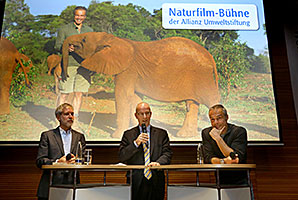Mr. Jaenicke, when the global community agreed to ban ivory trading in 1989, the future of elephants looked secure. Now, 26 years on, the Earth's largest land mammal is once again facing extinction. How could this happen?
After 1989, exemption provisions were agreed for the trade of old ivory which had been in storage. This had fatal consequences. It's hard to tell the difference between old and new ivory. If you were to buy a kilo of ivory in Asia today, it would set you back EUR 10,000. The fewer elephants alive, the higher the price. "White gold" is up there with platinum, gold and rare earth metals. Ivory is an incredibly flexible material. It's been called the 'plastic of yesteryear' and was a massively desirable material as far back as ancient Egypt. Later on the European colonial powers nearly made the elephant extinct with their hunger for ivory. Today the main consumers are in Asia, in particular in China and Japan. The reputation of Japanese filigree carving is built on ivory. Unfortunately, it's also played a role in Chinese medicine, where it's believed that powdered rhino horn or elephant tusk can make you virile, beautiful and immune to infection. Powdered, it is used to fight cancer, with dubious success. This puts the species under a double threat. On the one hand, ivory is used for artistic purposes. On the other, it's used to make knickknacks and bric-à-brac. Chinese people who think highly of themselves might even eat with ivory chopsticks. An ivory iPhone case is a “must” as well. If we don't stem this demand, there will be no more elephants left in Africa in 10 years.
Why has the trade in illegal ivory become a matter of national security?
People tend to focus on the animal welfare issue. But the only people who've understood that it's actually a security problem are the Americans. As Hillary Clinton said, "Ivory is a matter of national security." And she's right. Terrorist organizations like Boko Haram, the Lord's Resistance Army and many others finance themselves with ivory. You could cut off their funding by making the trade illegal. It's not just the trade in ivory that has to be made illegal: possession, too, needs to be illegal. Africans themselves are being exploited. They love the nature which surrounds them, but don't have the power to fight this cruel system. As long as a farmer continues to receive more money for a poached tusk than for 15 years of solid work, the killing will not stop. Even more impressive is the untiring dedication of all the rangers and scientists I met while filming.
What can we do to stop this bloody massacre?
I work in television. As an environmental activist, I can use this medium to great effect. People say that TV is dead, but it still has a strong impact. Here's an example: a few years ago I made a film about the barbaric practice of shark fishing. A manager at Rewe [German supermarket] saw the film. A short while later I met him at a sustainability event. He came up to me and said, "Mr. Jaenicke, I saw your film on overfishing. As a result, we only stock MSC-certified fish now." [editor's note: MSC is an environmental marker for sustainable fishing, issued by the Marine Stewardship Council]. Rewe, one of Germany's largest supermarkets. That was a massive success.
